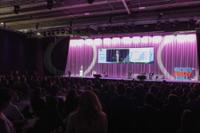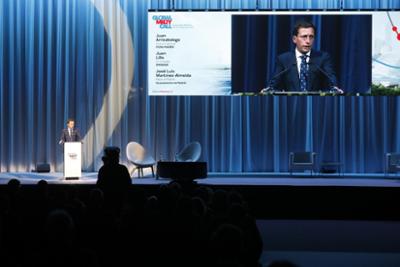

Sustainable mobility thrives at Global Mobility Call, with a 42% increase in the number of participants
Electrification and alternative fuels, transportation multimodality, new infrastructures and innovation will help boost a new paradigm of mobility. GMC confirmed a 3rd edition next year: 19, 20 and 21 November 2024 will be the dates when mobility stakeholders will meet again to push sustainable mobility
The second edition of Global Mobility Call wrapped up yesterday with great success in all its indicators, consolidating GMC as a key meeting point to discuss sustainable mobility with an holistic perspective. Onsite visitors increased by 42% to 8,000 professionals; and around 500 speakers took part in some of the 120 sectoral round tables and conferences. With over 104 participating organizations, the number of exhibitors grew 76% compared to the previous edition.
Organized by IFEMA MADRID and Smobhub, GMC Congress and Expo confirms itself as the unique international platform, bringing together all industries and stakeholders involved in the sustainable mobility of people and goods, where participants have the opportunity to delve into the latest trends, ground-breaking innovations, and state-of-the-art projects that are shaping the future of sustainable global mobility. Global Mobility Call has confirmed that a third edition will take place next year, 19 to 21 November.
The role of electrification and other alternative fuels in decarbonization, transportation multimodality, new infrastructures, together with innovation, digitalization and new technologies were some of the most mentioned topics, helping create a paradigm of a worldwide new mobility which shall be non-contaminant, safe, affordable and sustainable. The information provided by the speakers and the discussions in the congress areas will be compiled in the first GMC’s sustainable mobility report, which the experts from the Fraunhofer Institute will produce in the coming weeks. The purpose of this document is to make the knowledge generated during the event available to all stakeholders.
For the first time, Global Mobility Call had a country partner for the event: Italy, through the Italian Agency for Foreign Trade (ICE), which promoted Italian SMEs and startups in an exhibition space of 80 m2, where twelve of these Italian companies were present to showcase the "Made in Italy" technologies and innovation in the different sectors of sustainable mobility.
Also this edition presented for the first time its Innowinner, Personality and Sustainable Stand awards, that recognise the best technological initiatives, the sustainability of exhibitors and outstanding professional careers in favour of sustainable mobility. The prizes awarded were Innowinner to the company Antolin; Personality to Trent Victor, and Sustainable Participation to the stand of the company Arriva.
Top keynote speakers at the Main Auditorium
Among Spanish companies and institutional representatives, international keynote speakers (which represented 30% of total speakers) addressed worldwide mobility topics at the Main Auditorium. Bertrand Piccard, the first aeronaut to fly around the world in a solar plane without fuel, talked about existing solutions to tackle the environmental crisis in sectors such as mobility, energy, agriculture, waste, water and building, among others. The foundation he presides over has identified almost 1,500 solutions that could help move from the current "qualitative economy" model into another one aimed at "doing very efficient things with few resources and money".
Peggy Liu, JUCCCE (Joint US China Collaboration on Clean Energy) defended the role that China can play as a “fundamental infrastructure partner” towards a net-zero footprint mobility. Liu explained how the future of China's macro-cities is being forged with an environmental approach, to cope with the growing population in such spaces and more efficient mobility management.
Discussion on urgent mobility topics
Multimodality in passenger transport was one of the themes of this edition of Global Mobility Call, where experts have opted, for its optimal development, for public-private collaboration. Participants urged taking into account the situation of urban and rural environments and also invited taking into account the role of micromobility for last mile trips beyond collective transport.
Regarding the transformation of travellers’ services within the European Union, the development of Multimodal Digital Mobility Services (MDMS) was discussed, which the European Commission is preparing with the aim of protecting consumer privacy, adopting the latest technologies and putting the citizen at the centre of the strategy.
The last day of the congress hosted a comprehensive conference on Corridors 360º: Atlantic and Mediterranean. The trans-European corridors are a key multimodal infrastructure for economic and social development, as well as for connections within Europe and for the decarbonisation of freight and passenger transport. Institutional and private company representatives pointed out that these infrastructures are the lever that will allow better efficiency for companies and better connectivity for citizens.
Alternative powertrains
The electrification of vehicles was another of the thematic areas very present in Global Mobility Call, and was shown as an indispensable way for the change towards sustainable mobility models, together with digitization and innovation. Different experts in electric mobility explained the urgency of achieving a reality with a greater presence of electric vehicles and of accelerating electrification in order to meet the objectives set by the European Union. Other alternative fuels such as hydrogen or biomethane were also mentioned as complementary ways to achieve clean mobility.
State-of-the-art solutions at GMC Expo
The GMC Expo hosted over 100 companies and startups presenting their innovative projects. The expo showcased a diverse array of sectors, including transportation, infrastructure, consumer goods, technology, and legal, each playing a pivotal role in the development of mobility solutions.
At the exhibition area, the Mission H24 project exhibited its first hydrogen-electric prototype race car, the Le Mans Prototype Hydrogen (H2) Gaseous, and become one of the main attractions of the event. The car aims to showcase the potential of hydrogen both for the endurance circuit and for mobility in general. Some other of the novelties in this area were a Formula E simulator, a guide robot for blind people in big spaces, or pedestrian safety solutions, amongst others.
Outside the pavilion, the Turkish company Karsan presented e-Atak, an autonomous electric bus that, for the first time in Europe, in Norway, successfully manages road traffic in whichever road conditions and without the need for driver intervention.






